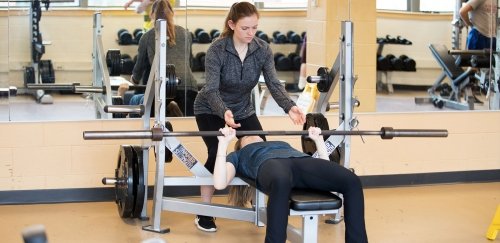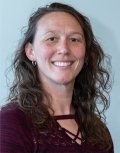Course Information
Here we provide information on course requirements, course descriptions and an Academic Rhode Map for each program, a semester-by-semester plan to help you toward graduation in four years.

The science behind fitness and wellness is evolving quickly, and the demand for trained and certified professionals is growing. In the B.S. in wellness and exercise science program, your coursework includes the study of anatomy, physiology and kinesiology; how to administer and evaluate health screenings and fitness assessments; and how to prescribe exercise for diverse populations. You will have experiential learning opportunities and a full-semester internship in a fitness and wellness setting. Upon successful completion of this program, you will be qualified to work in a variety of professional settings, including corporate fitness and wellness sites, rehabilitation facilities, community health agencies, fitness centers and strength and conditioning facilities.
Our program is aligned with the national standards of the industry set by the American College of Sports Medicine and the National Strength and Conditioning Association
Rhode Island College is an exclusive member of the Common Application.
Here we provide information on course requirements, course descriptions and an Academic Rhode Map for each program, a semester-by-semester plan to help you toward graduation in four years.
Upon completion of this program, students will be able to:
Writing plays an integral role in both the wellness industry and exercise science. It is used to communicate between professionals and their clientele, patients, athletes and colleagues. Writing allows professionals in these fields to record athlete and patient progress, construct personal and professional philosophies and advocate for policy change. Professionals use the scientific manuscript to disseminate research findings in an empirical and objective way.
The wellness and exercise science program has designated HPE 309: Exercise Prescription and HPE 427: Wellness and Exercise Science Internship as our WID courses.
HPE 309 is typically taken during the Fall Semester of year three. In this course, there is a written report where students practice assessing and programming on an individual basis. This comprehensive report demonstrates critical thinking, evidence-based practice and an introduction to APA formatting. The nature of this report allows for explicit writing instruction with multiple drafts and peer editing.
HPE 427 is taken during the final semester of the wellness and exercise science program. In this course, a capstone research project is required. This project contains a major writing component, with multiple revisions, peer editing and class time dedicated to writing. For these reasons, this course was chosen to be the final WID course in the major.
The range of written genres in which students engage and practice in the WID courses include academic writing, professional writing and reflective writing. Professionals in these fields write research manuscripts, policy papers, individual/program plans and evaluations and advocacy statements. These artifacts allow professionals to disseminate ideas and research findings and to communicate guidelines, recommendations and industry standards.
Engaging with these genres allows students to demonstrate proficiency in content knowledge, professional application, and personal growth.
The wellness and exercise science program recognizes writing is an iterative process. We strive to meet best practice models by scaffolding writing assignments in the following ways:
Upon completion of our WID courses, students will be able to use writing to:
In the Wellness & Exercise Science Bachelor of Science program, we strive to foster an inclusive culture that celebrates and supports diversity. The faculty and staff are committed to creating an environment that embraces individuality where people of all protected classes feel valued. Our holistic approach to education views differences as a strength in hopes to empower students to be agents of social change in their lives and professions. Our commitment to inclusion across race, gender, age, identity, ability, and lived experiences drive innovation, community involvement, and curricular change. Wellness and movement are the cornerstones of our program that offer common experiences and growth for all.

